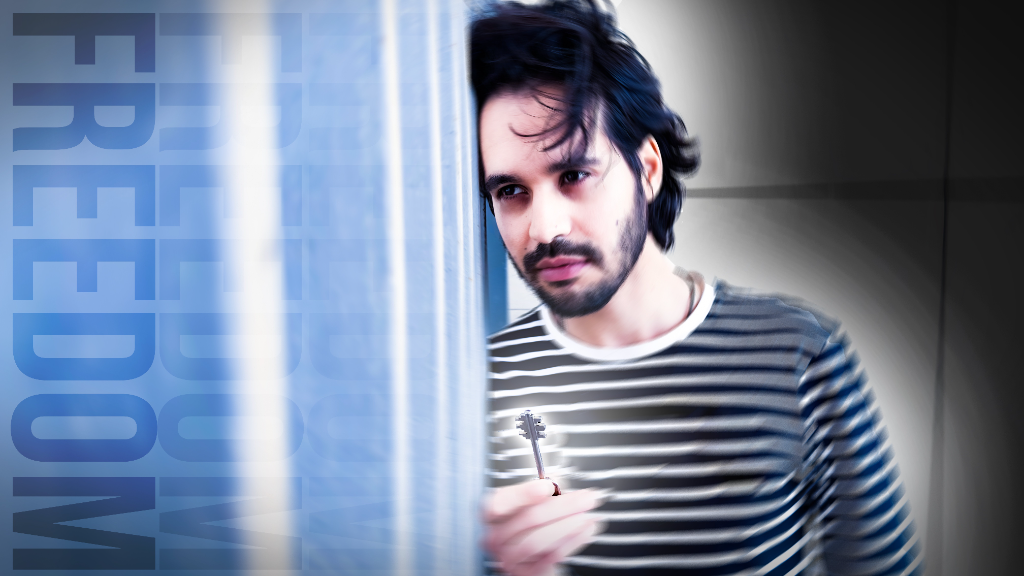À vos plumes
Another Leaf on the Tree
Published
2 mois agoon
[simplicity-save-for-later]
He was dragged in chains and he did not struggle as he waited for the guards to lead the way. The face of the prison was almost familiar and the shriek of the rusty door, as it opened to his new home, sounded strangely calm. It was almost comforting as it cut through the cold silence of the empty courtyard. His jailors wore no faces, said no words and the brick walls loomed so tall over the prisoner as if to devour him.
It could have been worse, he thought walking between chambers framed with crooked crossbars. He peeked through the bars and felt relief that all chambers were empty. He was whole in his solitude and in what others might have seen as hell, he found a place of peace. Looking ahead, he saw an open door waiting, as if it waited for him his entire life. He was drawn to it and when the guards locked the door behind him, he stood with his head held high.
This is what I deserve, this is what I need, he calmed himself and lay down on his bed, looking around his new home. The red bricks of his chamber were cracked and battered, looking like flames by the moonlight pouring down the small window, and yet they were cold to the touch. A large mirror hung in the middle of the rotting wall and its presence was felt. His eyes averted, for he feared his own reflection.
The silence that was once soothing started to get heavy on his heart and he started to tap his fingers on the metallic headboard of his small bed, just to hear something that was not his thoughts. He looked for hours at the abyss that was the dark ceiling, and he kept on staring religiously so that he would not err and see the mirror, yet err he did. The darkness overwhelmed him and he sat up with a jolt, begrudgingly looking at it for it was the only thing to see, and the harsh eyes of his reflection shocked him.
He did not recognize himself in the mirror. The eyes that stared back at him glowed red with malice and it filled him with dread. His image looked like the devil and felt like his own jury, judge and executioner. He felt disgust in his own image and minutes passed by with him enthralled by the man in the mirror, until the lips on his reflection slowly started to move.
“Do you like what you see?” Said the reflection.
“If I did I would not be here.” Answered the prisoner, with a mild tone of sarcasm. “Neither do I, to be honest with you.” Said the man in the mirror in a shaming way.
“And what is it that you want from me?” He questioned in a tone of despair.
“The world would love it if you stayed here. Frankly, you were born wrong.” Admitted the reflection and the prisoner’s temper rose.
“And with I, you were born. My defects are yours too. We look the same, think the same and speak the same, and this is a life you must live alongside me.” He answered.
As the prisoner snapped, his reflection softened. The face on the glass felt more human and his anger started to ebb little by little. For the first time in his life, he started to be at peace with what he saw. He found a friend in himself, which he never found anywhere else and it was more warming than he thought. It was a conversation he never wanted to end.
“So is it you and I against the world?” Said the reflection.
“Why should it be a fight?” The man was puzzled as he answered.
“Well the world never accepted us, why should we accept it?” He asked.
“Well we never gave it a chance to accept us, did we? The world was there and we never touched it.” Sighed the prisoner.
“We reached and it backed away in disgust, did it not?” The man in the mirror asked. “No, my friend. It reached for us and we backed away. The disgust was ours and it still is.” He responded in shame.
“But how can we? We’ll never find someone like us. What’s the point?” The confusion was apparent in the reflection’s voice, and for the first time, the prisoner saw himself and felt compassion.
“I wouldn’t know, but is it bad if we were so different? We might not be much, but we can be another leaf on the tree.” He responded with heartfelt hope.
“Alas, we are here and the world is out there.” Said the reflection as it glanced at the small cell window.
They did not feel it, but they went on for hours. Time flew by and the endless stories they kept away from each other left no room for silence and before they knew it, the sun rose and their horrid cell bloomed and felt vibrant with light. Their heart was closer to peace than ever before and they craved the world. They talked about what they might see, what they might hear and what they might do. The secrets of the world they once rejected were novelties they wish to discover.
Days went by as their bond strengthened and their hate for each other was a thing of the past. The freedom they once thought so undeserved, now they thought was their right, and so it was. Our prisoner itched to leave and he traced his cell, fidgeting left and right. He yelled for the guards but the guards did not answer. He shook the bars with impatience and he heard a faint clank on the chamber floor.
The key fell right out of his pocket. He stared at it in total confusion, picked it up and it felt right in his hand. He held the world and the world accepted him, and he was finally whole. As he swung the door open eagerly, colours bloomed around him as his winter gave way to spring. He made his way out of his prison as it crumbled behind him, and finally he was a free man.
Written by: « Rib7 ».
Articles similaires
You may like
À vos plumes
Albert Camus on Absurdism and The Beauty of Pushing Rocks.
Published
6 jours agoon
21 juillet 2024 [simplicity-save-for-later]
“What’s the meaning of life?”
A question that we all have pondered over. Yet, there seems to be no clear answer, or at least, no definite one.
The meaning of life is a long-standing subject of philosophical inquiry. While some nihilists and pessimists deem it as an impossible equation to solve – concluding that life is meaningless and one should grow indifferent towards it–, many other philosophers spent most of their lives searching for ‘The answer’, only to arrive at drastically different conclusions. It’s as if the answer refuses to be found, yet the urge to ask the same question remains.
This conflict between humanity’s desire for meaning and the universe’s indifference is what Albert Camus called The Absurd. This absurdity arises from humanity’s restlessness, always asking “Why?” despite the clear lack of answers. So, instead of hopping on this endless search, Camus decided to change the question altogether.
“We must ask: is it possible to live without appeal?”
His answer was yes, arguing that we should not let ourselves search in vain for the meaning of life, but rather, let go of it entirely.
However, grasping such a concept is not an easy task. For how can you ask someone to accept letting go of the only thing that fuels their existence and gives sense to it?
Well, Absurdism dares to argue that acceptance is what will eventually lead to liberation.
When one is going through an existential crisis, Albert Camus proposes 3 solutions:
Solution 1: You run, in a metaphorical sense, by finding meaning in things or concepts that bring you peace and solace such as religion, moral values, principles, and guidelines…. However, this can be considered as philosophical suicide, because you are running away from the problem instead of confronting the possibility of failing at solving its very question. Escapism can never be the answer, especially when these external sources may not resonate with everyone.
Solution 2: You put an end to your life (Do not recommend).
Solution 3: You accept that there is no answer, that life is indeed meaningless, yet, still worth living. You simply move on.
The core of Absurdism aims to end one’s futile suffering and push people into embracing life despite the lack of inherent meaning. Giving up on finding ‘The answer’ will definitely be more challenging than the pursuit of discovering it but the consequences will be way less daunting. Here, one can notice that Absurdism and Stoicism meet. Both philosophies encourage people to accept what one can not control without deeming it as a failure but rather as a strength. You can only suffer if you choose to. It all boils down to a matter of choice at the end. What you give importance to will eventually affect you positively or negatively and it is your responsibility to choose well.
Perhaps, to better understand The Absurd one should take a look at the Greek myth of Sisyphus: A former king condemned by the gods to push a boulder uphill for all eternity only to watch it roll back down again once he reaches the hill’s summit. Sisyphus’s punishment is the perfect analogy to humanity’s unending search for meaning. For what’s more absurd than repeating a futile task to pursue a goal that can never be achieved?
Through his studies of this myth, Camus has come to one important and radical conclusion:
“One must imagine Sisyphus happy.”
But, happy in what sense?
How can someone be truly happy if their whole life is reduced to consecutive failures?
Doesn’t true happiness lie in achieving goals? What’s the point of any of this?
Well, for once, we have an answer:
Perhaps happiness is found in the uncertainty of it all.
Sure, for Sisyphus pushing a rock up a hill over and over again must be exhausting. But did you ever wonder if he grows to enjoy it over time? If all that eternal meaningless labor becomes an art of his own?
Camus likes to imagine Sisyphus smiling every time the rock rolls down the hill, for amid all that absurdity, the Greek king has found meaning: To revolt by making his punishment self-justifying.
Sisyphus fully accepts his situation and hence, he allows himself to give it his all by living with passion, even if that passion consists of pushing a ridiculously heavy rock forever (to each their own, no judgment).
Now, how can we apply Absurdism to our daily lives?
First, it’s vital to take everything with a grain of salt. Philosophy is made to aid humans during their journeys on earth, not to further complicate it. Hence, dearest reader, it is you who decides what to take and what to reject from every proposed belief. For theoretically, the idea of remaining indifferent in the face of meaninglessness can seem doable. But in reality, it’s easier said than done. One must admit that at times staring into the absurdity of life without succumbing to despair or trying to claw meaning out of the leftover pieces can seem impossible. Yet, spending the rest of our lives anxiously clinging to questions and participating in a cyclic race with no view of the finish line is also self-destructive. So, I personally believe that a balanced approach is the answer.
Living authentically, finding joy within the struggle, and embracing the chaos of it all are valuable principles that any absurdist stands for. Not knowing which path to take or what decision to make, and feeling constantly lost and adrift, are inevitable human experiences that each one of us went through at least once in his life. What matters the most is actively choosing to seize the suffering of desperately holding on to the ‘perfect’, whether it is the perfect career, the perfect relationship, the perfect life, or even the perfect lunch. Within hardship, the act of pushing through itself will become the meaning. Constantly worrying about the outcome and isolating oneself from the joys of the world will only bring despair and recurrent dissatisfaction. In that case, life will simply pass you by and you’ll only be a spectator.
In the end, meaning is not found but rather created. And if Sisyphus, a former king who’s condemned to spend the rest of eternity pushing a rock up and down a hill, has found happiness, then so can you.
Written By : Fatma Ben Romdhane.




Share your thoughts